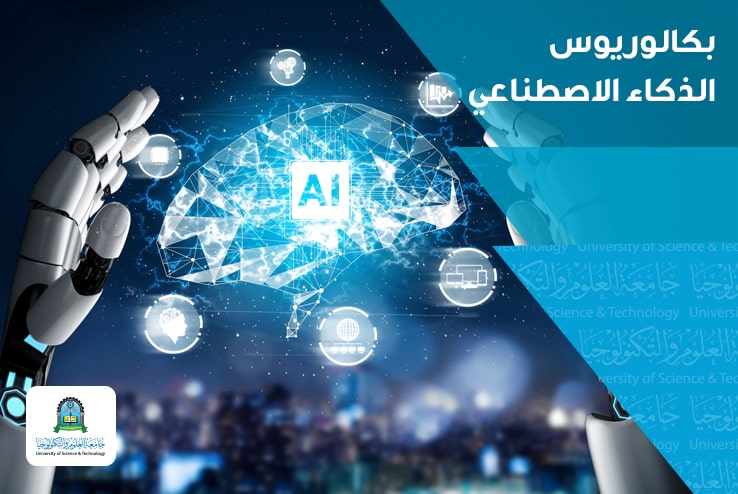Program Overview
University mission
إعداد خريجين متميزين في مجالات الذكاء الاصطناعي لتلبية متطلبات سوق العمل المحلية والاقليمية ومواكبة التطور في مجالاته المختلفة، وإجراء البحوث العلمية النظرية والتطبيقية بما يساهم في خدمة المجتمع.
University vision
برنامج بكالوريوس الذكاء الاصطناعي هي أن يكون برنامجًا رائدًا ومبتكراً في مجال الذكاء الاصطناعي على المستوى الاقليمي و العالمي.
Course Plan
Bachelor of Artificial Intelligence
four years


Our Values
- التميز: طموح متواصل للتميز الأكاديمي والمهني في الاختصاص.
- الأخلاق: الالتزام بأخلاقيات العمل والمحافظة على حقوق الملكية الفكرية.
- العمل الجماعي: تعزيز العمل الجماعي لتحقيق أهداف الفريق.
- القيادة: الإفادة من القدرات الفردية لأعضاء الفريق حيثما أمكن.
- النزاهة: التحلي بقيم النزاهة الفردية والمؤسسية.
- الإبداع: إبداعٌ وبراعة في تنفيذ العمل وتطويره.
- المسؤولية الاجتماعية: التفاعل الإيجابي مع المجتمع والإسهام في إثراء قيم التعاون بين أفراده.
المختبرات والمعامل
- مختبرات الكمبيوتر عدد(6)
- معمل الشبكات
أهداف ومميزات البرنامج
Program Goals
- اكساب الطالب معارف ومهارات تحليل وحل المشكلات باستخدام النماذج الرياضية الخاصة بالذكاء الاصطناعي.
- تدريب الطالب على استخدام تطبيقات الذكاء الاصطناعي في مجالات العمل المختلفة.
- تزويد الطالب بالمعارف والمفاهيم المهنية والقانونية والأخلاقية المتعلقة بالذكاء الاصطناعي.
- تنمية مهارات الطالب في مجال التعلم الذاتي.
Program Features
- A study plan that keeps pace with the local and international labor market.
- Distinguished academic staff.
- Laboratories equipped with the latest technology provide students and supervisors with the best educational practices.
- Free training courses to support the specialization through the Career Guidance and Graduate Follow-up Office.
- Technologies and equipment that keep pace with the latest scientific and technological developments in all university laboratories and classrooms, providing students with the best educational practices.
- Providing opportunities to participate in local and international events and competitions.
Career Opportunities
- خبيرًا في تنقيب البيانات.
- خبيرًا في علم البيانات وتحليلها.
- خبيرًا في برمجة الروبوتات وإنترنت الأشياء.
- مطور خطوط الإنتاج في المصانع وأتمتة الأنظمة.
- مطوّرًا للخدمات الطبية، والأدوية والعلاجات.
- مطور أنظمة خبيرة
- محلل وعالم بيانات
- محلل البيانات الضخمة
- مهندس الذكاء الاصطناعي
Admission requirements
- Applicants should fill up the admission application in accordance with the terms of the university.
- الأصل من شهادة الثانوية العامة أو ما يعادلها، مصدقة من الجهات المعنية، مرفقاً معها صورة طبق الأصل مصدقة.
- ترجمة الشهادة والتصديق عليها في حال إذا كانت بغير اللغة العربية.
- A copy of the applicant's passport or family card or passport.
- Six personal photos, size 4*6, with a white background.
- The registration payment slip.
Course Plan
Firstly: University requirements: (25) credit hours | |||
Course code | Course name | poison | Prerequisite |
BUST01 | Quran recitation and intonation skills | 1 | – |
BUST02 | English (1) | 4 | – |
BUST03 | Arabic Language | 4 | – |
BUST04 | Development of Leadership Skills | 1 | – |
BUST05 | Islamic culture | 4 | – |
BUST06 | English (2) | 4 | BUST02 |
BUST07 | communication skills | 1 | – |
BUST08 | Critical thinking | 1 | – |
BUST09 | Computer skills | 3 | – |
BUST10 | Scientific research methods | 2 | BUST03 BUST06 BENG05 |
secondly: College requirements: (41) credit hour | |||
Course code | Course name | poison | Prerequisite |
CIT01 | mathematics | 3 | – |
CIT02 | Calculus | 3 | CIT01 |
CIT03 | Probability and statistics | 3 | CIT02 |
CIT04 | Computer Basics | 3 | – |
CIT05 | Programming and problem solving | 3 | CIT04 |
CIT06 | computer programming | 3 | CIT05 |
CIT07 | Object Oriented Programming | 3 | CIT06 |
CIT08 | Introduction to Web Design | 3 |
|
CIT09 | Introduction to Databases | 3 | CIT06 |
CIT10 | Data Structures and Algorithms | 3 | CIT07 |
CIT11 | Operating Systems Principles | 3 | CIT04 |
CIT12 | Graduation Project (1) | 3 | CIT01 |
CIT13 | Graduation Project (2) | 3 | CIT01 |
CIT14 | Field training | 2 | CIT04 |
Third: Mandatory department requirements:18) credit hour |
Course code | Course name | poison | Prerequisite |
CS201 | Discontinuous structures | 3 | CIT01 |
CS301 | Algorithm design and analysis | 3 | CIT07 |
CS302 | Introduction to Computer Networks | 3 | 07CIT |
CS401 | Introduction to Artificial Intelligence | 3 | CIT07 |
CS402 | Software Engineering | 3 | CIT07, CIT10 |
CS403 | Computational theory and automata | 3 | CIT07, CS201 |
Fourth: Program requirements A. Mandatory program requirements (39) credit hour |
Course code | Course name | poison | Prerequisite |
CAI301 | Logic and Functional Programming | 3 | CIT06 |
CAI501 | Introduction to Machine Learning | 3 | CIT03 |
CAI502 | Advanced programming | 3 | CIT06, CIT07 |
CAI503 | Modeling and Simulation | 3 | CIT03, CS403 |
CAI505 | Artificial Neural Networks | 3 | CAI502 |
CAI606 | Introduction to Computer Vision | 3 | CAI505 |
CA601 | Introduction to Deep Learning | 3 | CAI501 |
CAI602 | Introduction to Natural Language Processing | 3 | CAI502, CS401 |
CAI603 | Machine learning algorithms | 3 | CIT03, CAI501 |
CAI701 | Data mining and big data analysis | 3 | CAI501, CIT10 |
CAI702 | 3 | CAI501 | |
CAI801 | Introduction to Robotics | 3 | CAI502 |
CAI802 | Ethics in Artificial Intelligence | 3 | – |
B. Elective Program Requirements (9) Credit Hours |
Course code | Course name | poison | Prerequisite |
CAI604 | Intelligent control systems | 3 | CAI502, CAI603 |
CAI605 | Image Processing Basics | 3 | CAI502, CAI505 |
CAI504 | Representing knowledge and thinking | 3 | CS201 |
CAI607 | Data Science Principles | 3 | CAI502, CAI701 |
CAI608 | Selected Topics in Artificial Intelligence (1) | 3 | CS401 |
CAI703 | Text Mining Basics | 3 | CAI501, CIT10 |
CAI704 | Parallel programming | 3 | CAI501, CIT07 |
CAI705 | Selected topics Artificial Intelligence (2) | 3 | CS401 |
CAI706 | Advanced Machine Learning | 3 | CAI501 |
CAI707 | Introduction to Cyber Security | 3 | CAI501, CS302 |
CAI803 | Selected topics Artificial Intelligence (3) | 3 | CS401 |
CAI804 | Internet of Things | 3 | CAI501, CS302 |
CAI805 | AI Applications and Case Studies | 3 | CAI501 |
CAI806 | Game design and virtual reality | 3 | CAI501, CAI502 |
CAI807 | Artificial Intelligence Project Management | 3 | CAI501 |
